Despite the geography of its name, the American Medical Student Association (AMSA) supports future physicians at a global scale. Founded in 1950 under the American Medical Association (AMA), AMSA became an independent organization in 1968.
Throughout its history, AMSA has resourced and informed future physicians throughout their medical education journeys, not just providing resources but supporting the opportunities students see to reshape medicine into a more accessible space for all.
We sat down with AMSA National President, Rohini Kousalya Siva, MD, MPH, MS, to discuss her work, the opportunities AMSA presents for international medical students, and some outlooks future physicians can be hopeful about.
Rohini joined us over a Zoom call on a sunny, Friday afternoon.
Riley (AMO): I wanted to start this more broadly–would you mind introducing yourself, your background and how you started in medicine?
Rohini: Yeah, definitely. My name is Rohini Kaushalya Siva, and I’ve been very passionate about healthcare, especially when it comes to health equity advocacy and providing patient centered care. I think that’s been my driving force throughout my academic as well as my professional journey.
I went to Johns Hopkins University for my undergraduate years, and it was so transformative. When I was studying there, I think I became very acutely aware of the complex social as well as political factors that influence healthcare outcomes. And I think what really ignited my commitment to health equity were my experiences working with anti-human trafficking NGOs and my role as a Woodrow Wilson Research Fellow, where I was looking at gender-based violence issues.
These experiences, gosh, they were so eye opening and really solidified, I think, my resolve to make a positive impact within the health care world. Just so that I could get a better understanding of health care systems as well as policies.
Later, I pursued my MPH degree at Dartmouth, and I had the privilege of delving deeper into the intricacies, I think, of health care systems, and I was able to take all of that knowledge and go to medical school at Eastern Virginia medical school with a very clear goal, and wanted to get as much training as I could to provide the best patient centered care that really goes beyond any of the boundaries and the barriers that we see in health care and to bridge those health care disparities.
And, I’ve been very honored to have been elected to the role of AMSA presidency as well. It gives me an opportunity to really advocate for meaningful change.
RN: That kind of leads me to my next question. When you look up your biography on AMSA’s website, it highlights your advocacy work a lot. Would you be open to sharing a little bit more about your advocacy work? I know you just touched on it a little bit, but what are some of the big issues or topics that you’re sort of focused on now?
RS: Like we were talking about, a lot of my work at first consisted of working on human trafficking issues and trauma informed care. Now, within this role at AMSA, I’ve been able to do a lot more. And some of the things that we’re focusing on right now are the advocacy priorities we voted as a board. are as a board, are advocacy priorities we’ve come together to vote on.
The first one is reproductive justice and abortion access. The second one is anti-racism and DEI efforts in medicine. And then the third one is creating a better physician pipeline for underrepresented people in medicine.
And some of the things that we’re working on currently is we’re working on eliminating race based clinical algorithms, especially in the pulmonary function test. We’re working with many different groups in creating that and making that happen, and we’re really empowering medical students with a comprehensive toolkit to let them advocate for the elimination of these race based clinical algorithms especially focused on PFTs.in FTEs
We’re looking at reducing health care disparities through the lens of evidence-based research and advocating for these comprehensive strategies to eliminate them. So, we’re creating a research directory that’s very clearly dedicated to clinical research at the intersection of health care disparities, so that we’re enhancing the accessibility and the visibility of crucial research in these fields. We’re also raising awareness on comprehensive mental health policies and their impact on medical students’ well-being and patient care.
That means we’re working on developing a medical education scorecard or a scorecard with a pilot project in the mental health domain that evaluates medical schools, mental health policies, their initiatives, their resources. And then we provide a clear assessment of their commitment to student well-being. So we’re doing that survey right now.
We’re also establishing a physician pipeline action committee and a campaign to increase representation of underrepresented individuals in the medical field, really enabling and fostering that diversity and equity.
With reproductive justice, we’re advocating for equitable health care policies through all our campaigns and our policies, including awareness campaigns. What we’re doing is mobilizing members to advocate for policies that safeguard but also extend reproductive rights, transgender health care rights, equitable health care access.
We’re also doing a storytelling campaign that is looking at students, at medical students applying to OBGYN residencies or family medicine residencies and looking at the impact of how many people are applying to these residencies in states with abortion restrictions. We’ve seen that there’s a decline in those numbers. So we’re doing a whole lot.
RN: Oh yeah. No, that is a lot, but it all sounds like good and very important work, especially when you think about where a lot of these state-level policies start to affect medicine and healthcare nationally.
So that was all very insightful to sort of what Amsa’s working on as an organization, but to turn the focus to you. Could you describe your role at AMSA and then what your work itself centers on?
RS: Sure, sure. As President of AMSA, my primary focus is on spearheading these advocacy efforts and really shaping the organizational priorities around it. But in addition to leading the advocacy initiatives, I also serve as the chair of the board of trustees and as the organizational spokesperson. I also do a lot of work planning for AMSA’s national convention, along with our wonderful staff members.
Another wonderful responsibility that I have is working with the International Federation of Medical Students Association, or IFMSA, to work with them and really find ways to promote global collaboration in medical education. I also work as a member of the finance subcommittee of the Board of Trustees, which manages the financial oversight, fostering those strategic partnerships, engaging in different grant proposals, writing MOUs for partnerships for funding, etcetera.
I’m also very committed to creating our comprehensive research directory for all AMSA members. So I’m working on that. I’m a representative for the Federation of State Medical Boards, or the FSMB working Group, where I look into what should be our guiding recommendations when we’re doing state medical board licensing. And finally, we’re working with the Senate Health Committee, which is chaired by Senator Sanders, and actively participating in different organizational committees as well.
RN: I actually probably should have asked this as a follow up to my initial question, but when did you first become involved with AMSA? What has your journey been like up to where you are now as president?
RS: Yeah, yeah, it’s been a great journey. I started my AMSA membership in 2017. That was when I was a pre-medical student. I was a medical master’s student at Eastern Virginia medical school before I entered into their MD program. Um, and it’s been oh so great. I fell in love with AMSA’s advocacy work. It was unlike any other organization that I’ve been a part of. And so when I started, I really wanted to kind of grow and work a lot more with AMSA.
I became EVMSs medical student chapter leader–so the chapter president–for two years and was closely connected with the national AMSA leadership as well. I knew that I wanted to get kind of more involved in national leadership positions at AMSA, so I became the co-chair of the Just Medicine campaign that was looking into pharmaceutical companies like The Conflict of Interest policies.. After that, I got the wonderful opportunity to run for the AMSA presidency, and it was the best decision I think I made.
RN: What would you say is the most exciting part of your work?
RS: The best part of my role is definitely engaging with students, really interacting with them, listening to all their passions and why they’re in they’re in in medicine, but also understanding the challenges that they’re facing. It’s great to. It helps me work along with them and collaborate in working towards towards solutions, which is so rewarding. And I just really love hearing their enthusiasm and their dedication–that I think is one of the best parts of my role. We all work together to foster that supportive environment where all of their voices are heard so that they can become the best physicians that they can be. It’s this dynamic exchange of ideas.
RN: AMO began by working with international medical students and international medical graduates who are seeking residency placements in the US healthcare system. What makes AMSA a good organization for an international medical student?
RS: Oh, absolutely. I think AMSA is one of the best organizations for international medical graduates to really engage in because we’re very inclusive and supportive towards our approach to medical students from diverse backgrounds. We also provide a platform for all IMGs to connect, to share their experiences, and to access resources that are very particularly relevant to their unique journey in navigating the US healthcare system.
Also, AMSA actively advocates for the interests and concerns of all medical students, international domestic medical students, everyone. So I think AMSA’s commitment to diversity, equity, and inclusion really helps in fostering a community where IMGs can find mentorship ,that can gain insights into the residency application process and contribute to initiatives that address the challenges that are very specific to their career path. I think programs wewe provide are very valuable, and we create as well as a welcoming space, provide resources for IMGs to pursue residency placements and careers within the US healthcare system.
RN: As medical students look forward to starting their careers, when they look at the news, there’s a lot out there about worker shortages, physician shortages, burnout. And I think that’s rightfully placed, but I kind of want to open the floor to maybe a more optimistic outlook that medical students might have. What is something that you see on the horizon or that’s ongoing that a future physician should be excited about?
RS: Oh, so many things. I think there are definitely is definitely concerns for worker shortages in healthcare, and definitely so many other concerns that we have. But there’s so many optimistic opportunities for the future as aspiring physicians that we should hold on to as well.
First, is there’s advancements in technology and telemedicine, artificial intelligence, and digital health tools. They keep improving patient care and streamlining processes and expanding access to medical service. That’s something that I’m personally very, very excited about. And I know a lot of medical students are as well. I
We’re going more towards a personalized medicine and patient centered health care systemthing, and that holds so much promise. Future physicians will be able to anticipate tailoring treatments to individual patients, having a very patient-based, patient-centered health care system in place. And that’s wonderful.
There’s interdisciplinary collaboration. So, you know, within health care, all the health care professionals are working together to address all these complex medical issues. And that collaborative approach can and will enhance patient outcomes, and it fosters a more holistic approach to health care.
There’s different global health opportunities that are opening up the interconnected world. I think it allows physicians to engage in all of these global health initiatives and contribute to the well-being of all communities, and really gain diverse perspectives themselves, which is, again, a great professional learning skill, but also personal learning skills to have and research. I mean, the medical research breakthroughs that we have ongoing, like understanding different diseases, developing these new treatments, and improving diagnostic tools.
There’s also more focus on preventive medicine now, which I love–seeing more of a more shift towards preventive measures and lifestyle interventions. And physicians are playing such a pivotal role in that and that’s wonderful, especially when you see the diverse career paths. The healthcarehealth care industry offers so many different paths for us beyond just traditional clinical practice. There’s healthcare administration, there’s policy and advocacy that I’m currently doing, there’s medical journalism, there’s innovation. There’s all these different things.
And there’s a lot more growing recognition of the importance of mental health and overall well-being. So we’re looking at physician burnout a lot more and really also looking at future physicians, how they can contribute to reducing the stigma around mental health issues and providing comprehensive health care. So there’s a whole lot of fields, a whole lot of opportunities for future physicians to be a part of and be really excited about. And the opportunities that we have are going to keep growing.
RN: Yes, definitely. I did want to leave space at the end for anything that to discuss anything that we haven’t touched on yet. Especially if someone came across this interview but wasn’t familiar with AMSA, what’s something they should know?
RS: Yeah for sure. So AMSA is for pre-med and medical students. This is for future physicians. That is the platform that we want. So any gaps that you see in your medical education, we aim to bridge those gaps. And we have 30,000 members. We have 350,000 alumni all over the world. And we would love for you to be a part of it. And if there’s any questions, please feel free to reach out to me. My email is press@amsa.org.
RN: Perfect. Thank you. Thanks so much again for sharing some of your insights into the field but also sharing more about the opportunities AMSA presents to medical students and future physicians.
RS: No problem. Thank you so much.
Learn more about the benefits of an AMSA membership by clicking here or create your free AMO user account here.


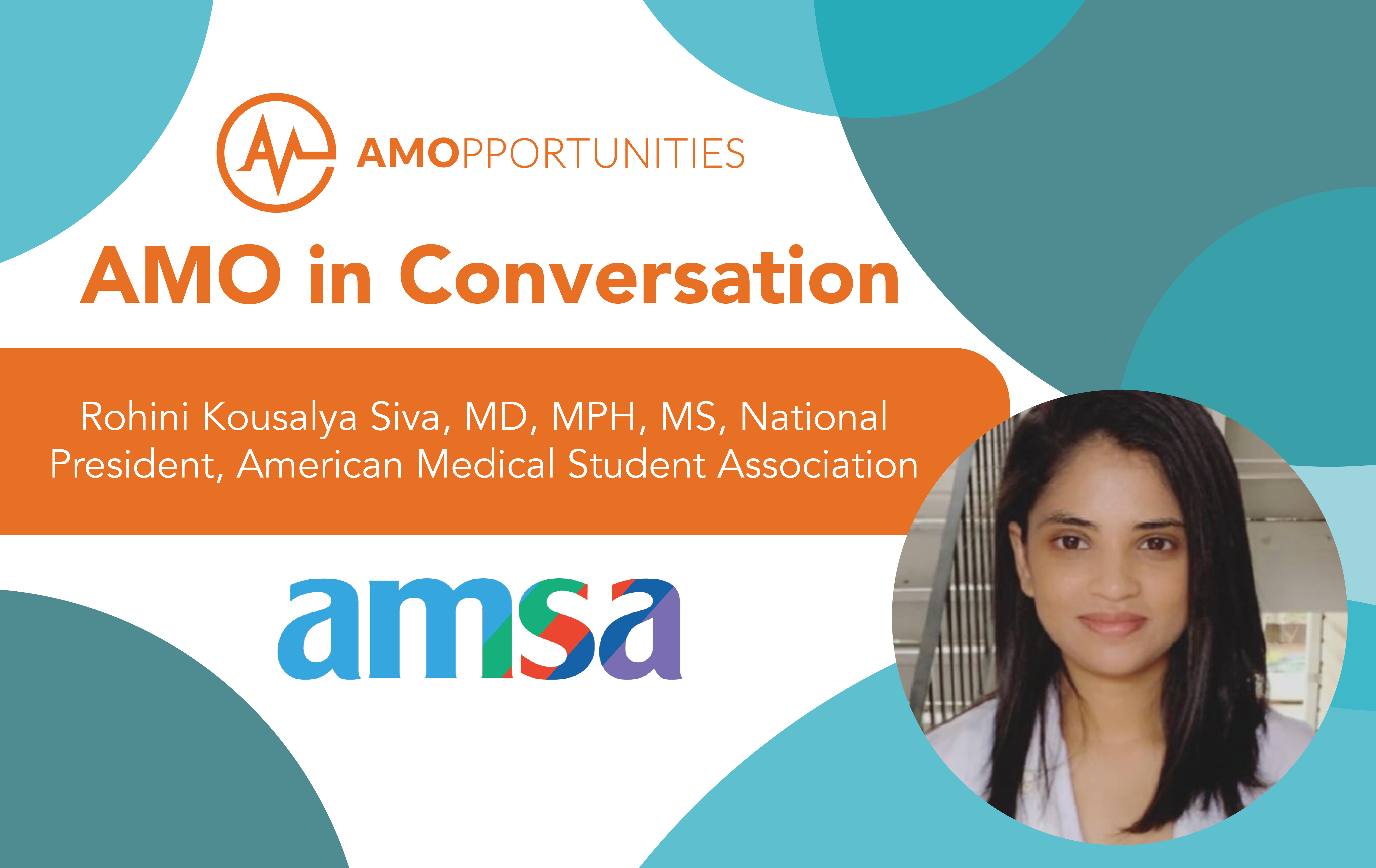
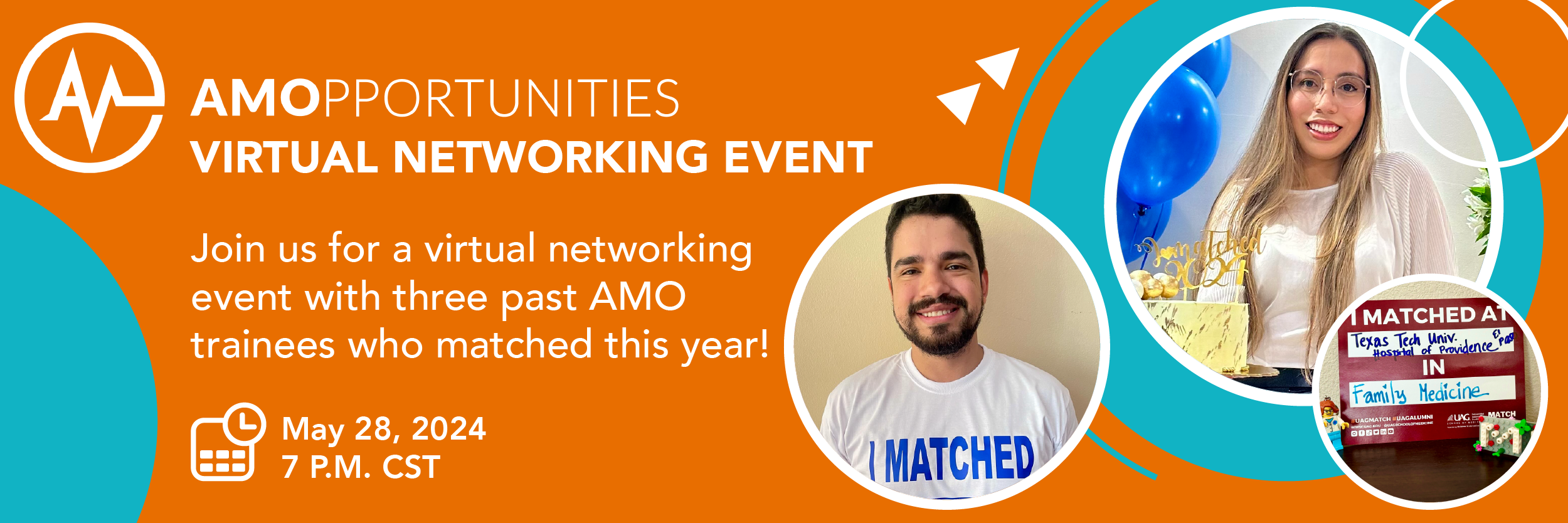
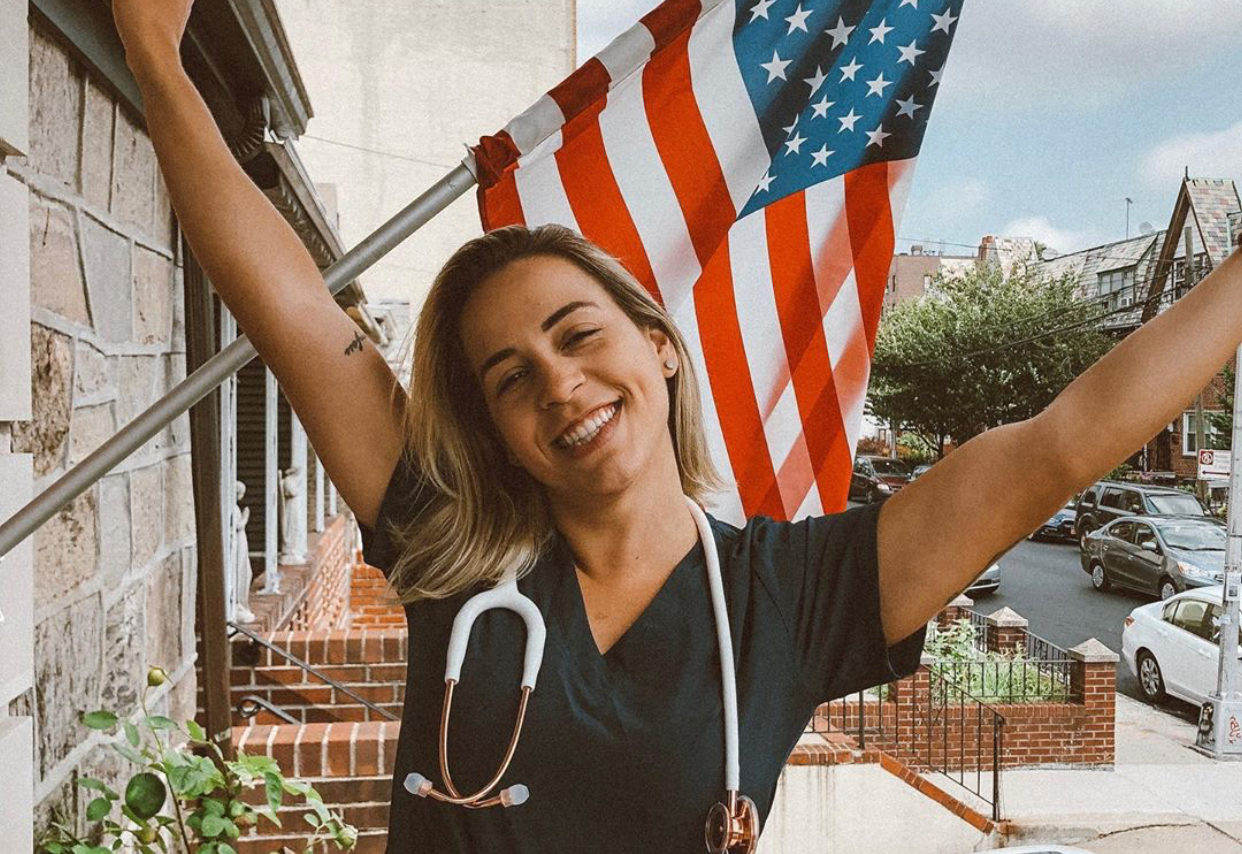
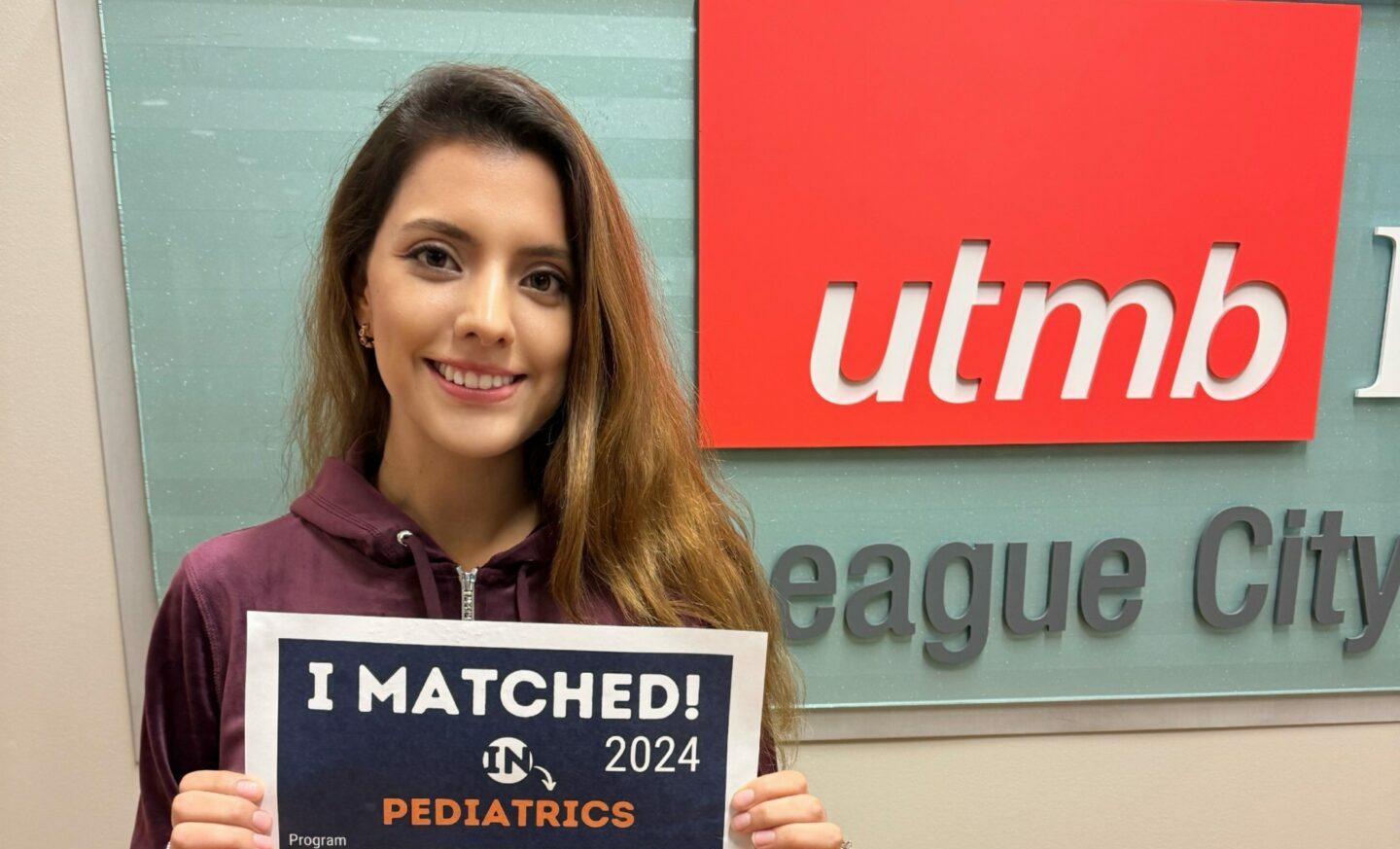
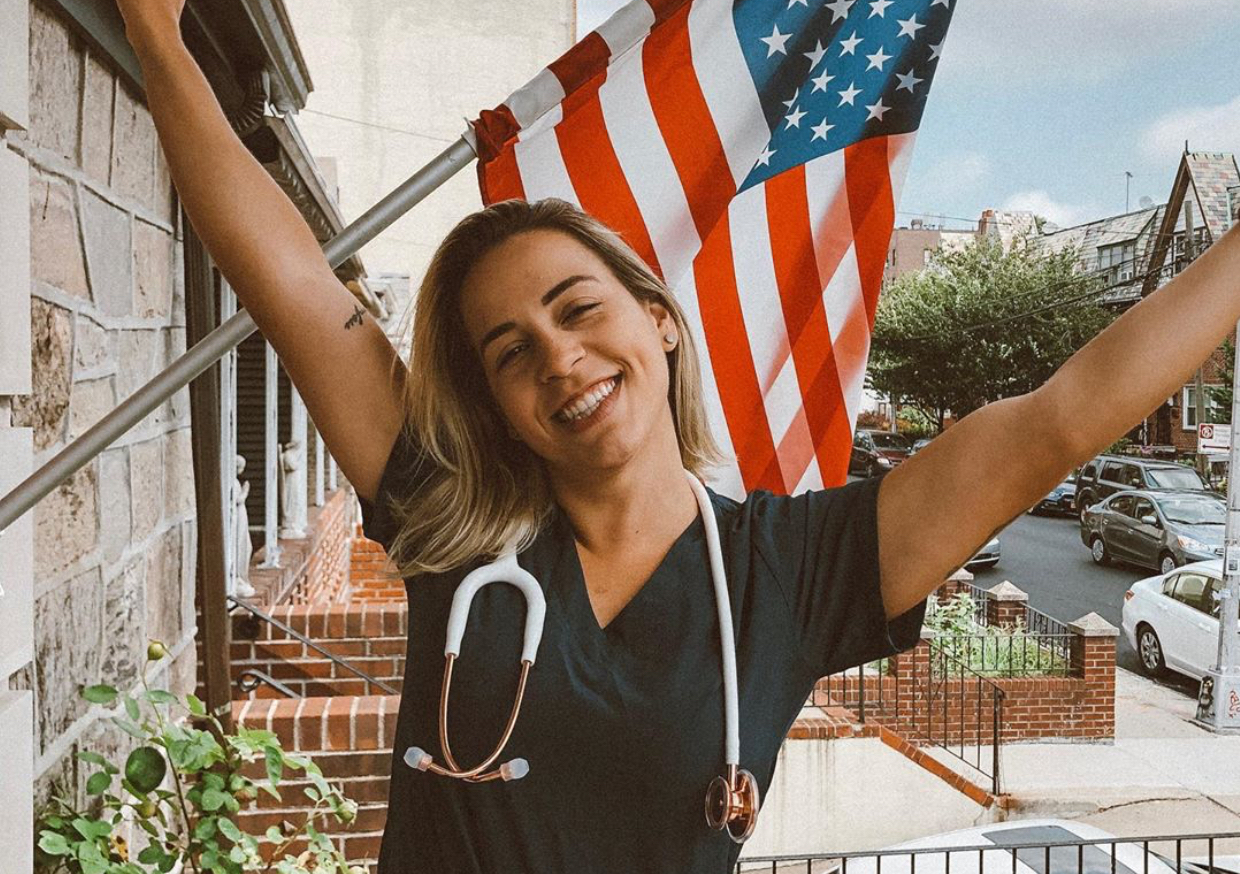
Leave A Comment